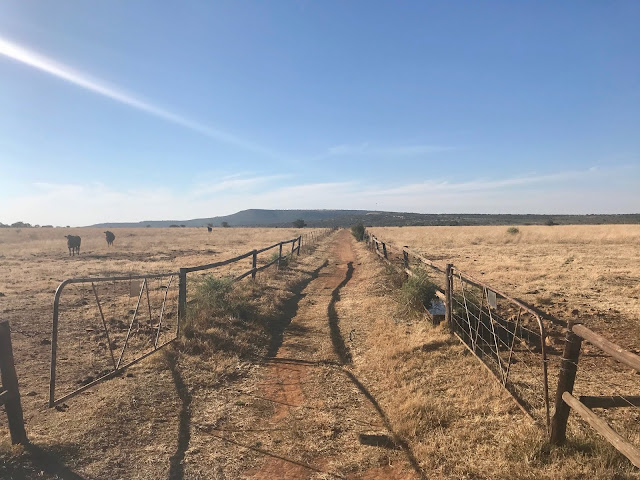It's been difficult to get a clear sense of South African "culture." First and foremost, South Africans are very friendly and family-oriented. They take the time to greet everyone always. When picking up a call from an unknown number, they ask "How are you?" before asking "Who is this?" I've heard theories about this cultural practice in other Sub-Saharan African countries with a history of violence between ethnic groups as part of a desire to maintain the peace.
 On a city level, the culture is not very engaging for tourists. Typical cultural activities/attractions have been hard to come by, ie sights, arts, interesting festivals, unique places to visit. On the other hand, it should be noted that it IS winter and I'm living in a fairly rural town. Still, we were a bit bored when in Johannesburg and later Durban each for several days. What most locals do on the weekend is 1. braai (*the beloved SA form of barbecue, but I'll save that for another post on food), 2. drink alcohol, and 3. visit the mall.
On a city level, the culture is not very engaging for tourists. Typical cultural activities/attractions have been hard to come by, ie sights, arts, interesting festivals, unique places to visit. On the other hand, it should be noted that it IS winter and I'm living in a fairly rural town. Still, we were a bit bored when in Johannesburg and later Durban each for several days. What most locals do on the weekend is 1. braai (*the beloved SA form of barbecue, but I'll save that for another post on food), 2. drink alcohol, and 3. visit the mall.
Starting at 3:30pm on Friday, everyone races out of work. The liquor store had a line of cars out the parking lot when we passed. The hospital frantically tries to clear beds because weekend alcohol-related violence is so bad that "casualties" (what they call the ER) is swamped. As one "registrar" (what they call residents) put it, people start drinking Friday night, start getting stabbed Saturday, and start realizing they've been stabbed by Sunday.
South Africa has a very high rate of violent crime. This probably contributes to the lack of street culture because people don't walk anywhere or even exit their cars unless they are poor. All the houses are surrounded by tall walls with barbed wire and electric gates. Most of all, people like to talk about how unsafe it is.
The malls are just like American malls, if not more boring, but still locals refer us to them as "can't miss" attractions. They have wifi and air conditioning and Western-style fast food restaurants—all requirements for the bourgeoise to demonstrate their status, a theory for their popularity in so many developing countries (see the book Lost in Mall: An Ethnography of Middle-Class Jakarta in the 1990s).
All this is not to say that South Africa doesn't have a vibrant culture in its own right. It DOES have culture in the way that people think and view the world is unique and complex and intimately tied to the country’s history. Identity in particular is so multi-faceted, but one Sunday a couple weeks ago we got a chance to better understand some aspects. Through a connection at the hospital, we were invited by an old farmer couple to visit their vast land holdings where they breed race horses. The family has owned the land since a British grandfather arrived 150 years ago and was told to ride his horse for an hour in one direction, turn 90 degrees, ride for another hour, and turn again until he made a square of land that would then be his. He built the manor in which the family still lives. The current farmer/horse breeder graciously drove us for a tour where we stood in the bed of his "bakkie" (what they call pick-up trucks), right behind the cab, to have a good view of the antelope, meerkats, and other animals on the plains.

The land also happened to contain a National Heritage Site of rock engravings done by Bushman people. We had to trek through the bush and wander until we found them, as they were very understated and hidden, despite being rather famous. The farmer relayed to us the history of the original peoples on the land. The whole experience was incredible for better understanding South Africa. In particular, we got an inside look into how the well-off, white, rural South African population lives. Clearly this couple's home and history were here in Klerksdorp, and they feel very connected to South Africa.
Afterwards the couple insisted we stay for lots of tea and cookies. Then they personally sliced us raw antelope meat, shot on their land, served with lemon and wasabi jelly. (If you're familiar with my iron stomach, it will come as no surprise that, despite my usual vegetarianism, I was the only one to NOT get sick that night from all the carpaccio.)

As a final note on South African culture, the land itself is quite beautiful and a central part of the culture. Every evening the whole sky is consumed by a rainbow sunset. I've been pretty lucky in getting to travel across much of the 'Rainbow Nation' and see all the amazing landscapes. The geography and weather are so diverse that it could be a case study in different meteorological climes.
 |
| Atop Drakensberg Mountain Range |
 |
| Drakensberg Mountain Range |
 |
| Ladder down the side of a cliff to climb the Drakensberg Amphitheatre |








































